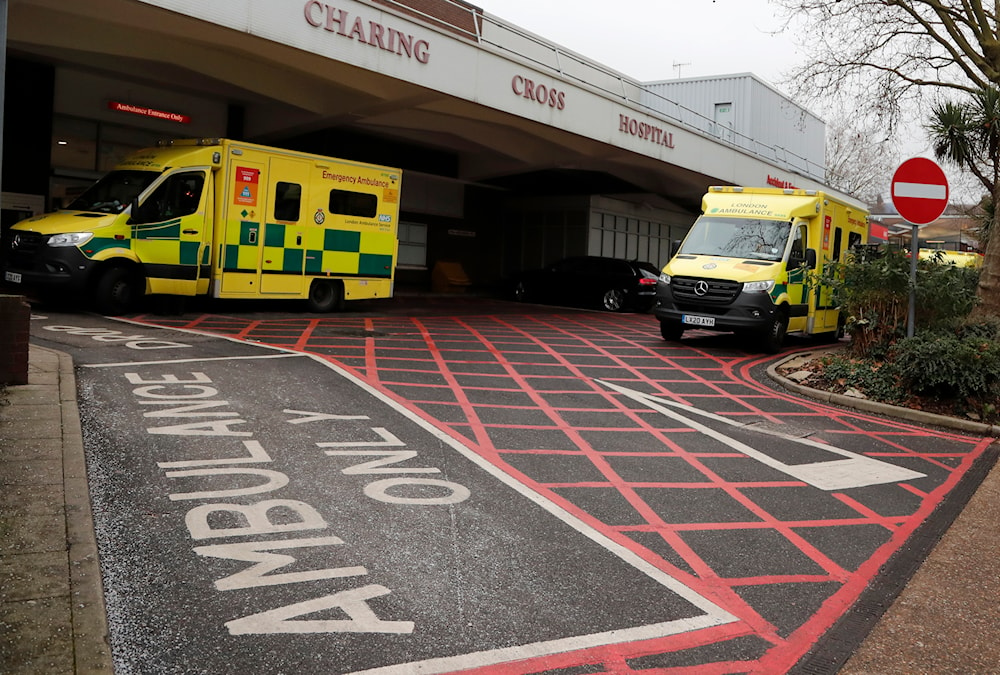England’s hospitals may cut 100,000+ jobs amid cost-cutting directives
England’s NHS could cut up to 150,000 jobs under a major cost-saving overhaul, with health leaders warning the £2bn redundancy bill may undermine patient care and reform efforts.
-

Ambulances are parked at the emergency arrival at Charing Cross Hospital in London on January 8, 2021. (AP)
Hospitals in England could face over 100,000 job cuts due to a sweeping overhaul and severe cost-cutting measures ordered by Wes Streeting and NHS England’s new chief executive, Sir Jim Mackey.
The scale of potential redundancies has prompted NHS leaders to urge the Treasury to step in, warning the cost could exceed £2 billion—funds they say they don’t have.
Mackey has instructed the 215 health trusts in England to slash corporate function costs—covering HR, finance, and communications—by 50% by year’s end. However, according to the NHS Confederation, some trusts believe that meeting that target could mean shedding 3% to 11% of their entire staff, translating to 41,100 to 150,700 jobs across the 1.37 million-strong NHS workforce.
Matthew Taylor, chief executive of the NHS Confederation, called the savings targets "staggering" and said they may leave trusts unable to reduce treatment backlogs. He urged the Treasury to set up a “national redundancy fund,” warning, “Unless the Treasury creates a national redundancy fund to cover these job losses, any savings the government hopes to make risks being eroded at best and completely wiped out at worst.”
The looming cuts come as Streeting and Mackey prepare to face MPs on the health and social care committee to explain their plans.
Half of NHS England’s 15,300 staff expected to lose jobs
The NHS is preparing for unprecedented layoffs after the decision to dissolve NHS England and slash senior management. Roughly half of NHS England’s 15,300 staff are expected to lose their jobs in the merger with the Department of Health and Social Care, which also anticipates staff reductions among its 3,300 employees. Meanwhile, the NHS’s 42 integrated care boards, which employ 25,000 people, could shed another 12,500 roles.
Taylor added, “The scale and pace of what has been asked of them to downsize is staggering and leaves them fearful of being able to find the right balance between improving performance and implementing the reforms needed to put the NHS on a sustainable footing.” He emphasized that financial security is crucial for delivering the government's upcoming 10-year health plan.
Some NHS trusts are setting aside up to £12 million each for redundancies this year, according to the NHS Confederation, while others say they can’t afford layoffs and will rely on natural staff turnover to reduce headcounts.
Read next: Northern Ireland's public services face risk of potential collapse
Sarah Woolnough, CEO of the King’s Fund, acknowledged public concerns over NHS spending but pointed out that only 1.9% of the UK’s health budget goes to administration, one of the lowest among 19 comparable countries. “You need highly skilled and experienced people in key behind-the-scenes roles… cutting cost is not the same as increasing efficiency,” she said.
NHS England has told all 215 trusts to reduce spending by 5% this year through “cost improvement programmes,” as the service faces a projected £6.6bn overspend.
A Department of Health and Social Care spokesperson defended the reorganization: “Our plans to bring NHS England back into the department will eliminate duplication, freeing up hundreds of millions of pounds for frontline care.” The spokesperson also noted that an additional £26bn is being invested in health and care, claiming progress on reducing waiting lists and increasing patient appointments.

 4 Min Read
4 Min Read








